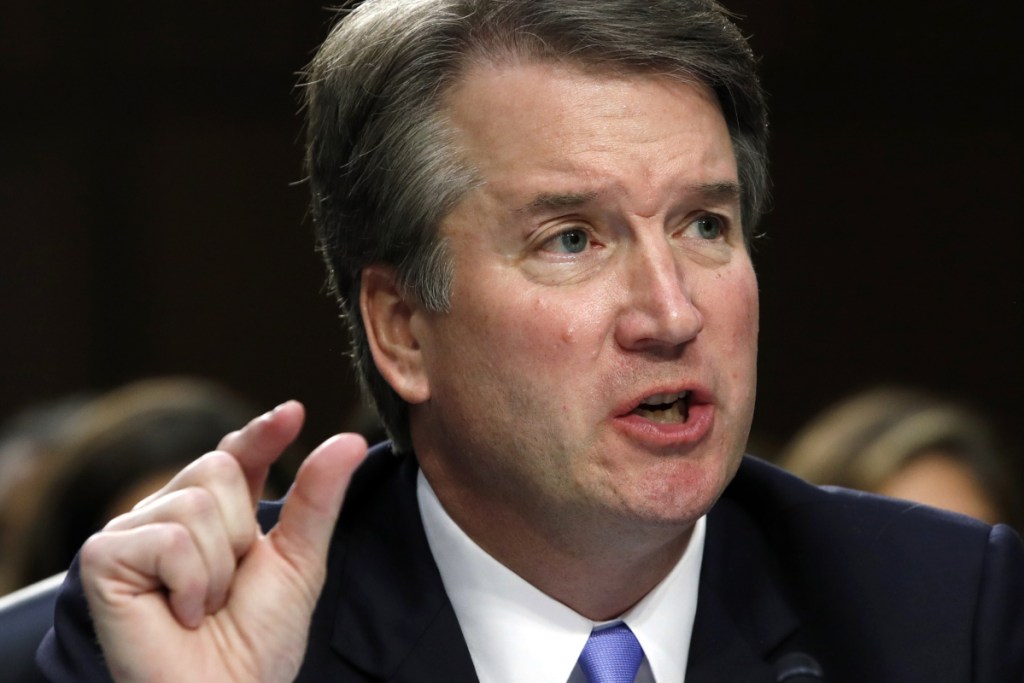A weird feature of our time is that nobody wants to take anything seriously unless it’s supposed to be a secret. If you expect politicians to lie all the time, it can seem like a good idea to ignore everything they say and do in public and then try to piece together the real story with the help of anonymous whispers.
But there’s a problem with this approach: Sometimes they’ll actually tell you exactly what they are up to, and you could miss it if you’re too busy reading between the lines.
It’s no secret that Supreme Court nominee Brett Kavanaugh is a hard-core anti-regulation judge who almost always sides with polluters when environmental cases come to his court.
But that part of his record doesn’t get much attention because it isn’t hidden in unreleased memos or private conversations and it doesn’t have to be dragged out of him in tough cross-examination. It’s all laid out in black and white in published opinions that stretch back a dozen years.
According to the Environmental Working Group, a nonprofit public interest law firm, Kavanaugh has been presented with 26 environmental protection cases since coming to the D.C. Court of Appeals in 2006. In the 18 cases that were decided on substantive grounds, not procedural ones, he came down on the side of less protection 16 times.
His opinions argued against:
• The Environmental Protection Agency’s authority to regulate air pollution that crosses state lines, something that matters in Maine, where what we breathe today was recently floating over coal country.
• The EPA’s ability to address the biggest environmental issue of our time — manmade climate change — because greenhouse gases like carbon dioxide are not specifically identified as pollutants in the Clean Air Act.
• The EPA’s decision to cancel a mining company’s permits after it was caught dumping coal waste into streams. He argued that the agency should have considered the cost of the enforcement action to the company, even though the law makes no mention of cost.
Many of Kavanaugh’s opinions were dissents, written from the losing side of the case. But that would probably change if he were to join the Supreme Court, where there are already four votes for rolling back other environmental regulations. One endangered law is a provision of Maine Sen. Edmund Muskie’s Clean Water Act that outlaws discharging waste into tributaries if the pollution affects the main river.
A fifth vote in a case like that would “be a disaster for our environment, along with thousands of miles of Maine streams,” according to Maine outdoor writer George Smith.
Kavanaugh is no legalistic ideologue. He comes to his positions using a variety or routes.
In Coalition for Responsible Regulation v. EPA, Kavanaugh said that by regulating greenhouse gases, the agency — part of the executive branch — had exceeded the authority Congress had given it, and wanted to strike down the rule in deference to the separation of powers.
In Natural Resource Defense Council v. EPA, Kavanaugh backed the agency’s ability to interpret the statute and ease back pollution standards on its own.
But one thing is consistent: the result. Kavanaugh comes down in favor of the polluters 16 times in 18 tries, a Hall of Fame batting average in any league.
Maine’s senators are still officially undecided on the Kavanaugh nomination, but Sen. Susan Collins has hinted that she is a likely “yes.”
Even though every organization from Planned Parenthood to Students4Life is convinced that Kavanaugh would be the fifth vote for rolling back abortion rights — possibly even overturning Roe v. Wade — the pro-choice Collins says she’s satisfied with Kavanaugh’s assurance that he considers it “settled law.”
But on the environment, there’s no need for guesswork. His record is long and unambiguous.
The vast majority of Americans are not industrial polluters. But the very few who are tend to be rich enough to fund organizations like the Federalist Society, which grooms young lawyers and help them in their careers so they can advance the interests of their patrons, maybe someday on the nation’s highest court.
It’s no secret that the interests of big business often conflict with the interests of regular people. But just because it’s not a secret doesn’t mean that we shouldn’t take it seriously. Clean air and water matter too much.
Greg Kesich is the editorial page editor. He can be contacted at: gkesich@pressherald.com
Send questions/comments to the editors.



Success. Please wait for the page to reload. If the page does not reload within 5 seconds, please refresh the page.
Enter your email and password to access comments.
Hi, to comment on stories you must . This profile is in addition to your subscription and website login.
Already have a commenting profile? .
Invalid username/password.
Please check your email to confirm and complete your registration.
Only subscribers are eligible to post comments. Please subscribe or login first for digital access. Here’s why.
Use the form below to reset your password. When you've submitted your account email, we will send an email with a reset code.